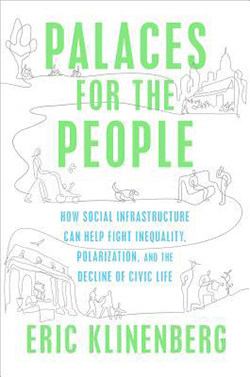
Staff Pick: Palaces for the People by Eric Klinenberg
I recently reread Eric Klinenberg’s 2018 nonfiction work Palaces for the People: How Social Infrastructure Can Help Fight Inequality, Polarization, and the Decline of Civic Life.
In Palaces for the People, Klinenberg talks about social infrastructures–shared spaces such as libraries, childcare centers, religious centers, and parks, for example–where communities are formed and come together. Klinenberg shares that these spaces are often crucial and life-saving on the communal and individual levels.
Klinenberg’s interest in social infrastructures stems from his research into the deep schisms dividing America during the book’s publication–an issue that persists today. Klinenberg asserts that the spaces of social infrastructure play integral roles in sustaining a flourishing civic life and could be vital to bridging our ever-growing cultural divides.

The reporting shared evidence of how established or developing social infrastructures support or grow populations is truly fascinating and remarkable. Klinenberg shares stories from around the globe – from as far away as Spain to as close to home as the streets of Chicago – where civil and urban engineering have shaped and been shaped by the communities for the betterment of neighborhood and city alike.
Palaces for the People was enriching and inspiring to read in 2018 – especially as a librarian. In the wake of COVID, the perspectives offered are even more interesting to consider in retrospect and while imagining the future.
In addition to the book’s core subject, Klinenberg has some interesting perspectives on isolation, climate change, the effects of the internet, amongst other things, concerning our social, political, and cultural spheres. There is also an interview with Eric Klinenberg on the 99% Invisible podcast that I would recommend in conjunction with the book. The interview delves into Klinenberg’s background and original interest in social infrastructure and details how Gilded Age titan Andrew Carnegie fits into the topic as a whole.
Reviewed by Sarah Burkard, Web Content Manager